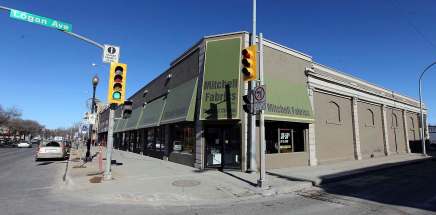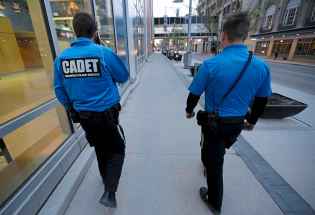Province gives police help to smoke out cannabis scofflaws
Read this article for free:
or
Already have an account? Log in here »
To continue reading, please subscribe:
Monthly Digital Subscription
$0 for the first 4 weeks*
- Enjoy unlimited reading on winnipegfreepress.com
- Read the E-Edition, our digital replica newspaper
- Access News Break, our award-winning app
- Play interactive puzzles
*No charge for 4 weeks then price increases to the regular rate of $19.00 plus GST every four weeks. Offer available to new and qualified returning subscribers only. Cancel any time.
Monthly Digital Subscription
$4.75/week*
- Enjoy unlimited reading on winnipegfreepress.com
- Read the E-Edition, our digital replica newspaper
- Access News Break, our award-winning app
- Play interactive puzzles
*Billed as $19 plus GST every four weeks. Cancel any time.
To continue reading, please subscribe:
Add Free Press access to your Brandon Sun subscription for only an additional
$1 for the first 4 weeks*
*Your next subscription payment will increase by $1.00 and you will be charged $16.99 plus GST for four weeks. After four weeks, your payment will increase to $23.99 plus GST every four weeks.
Read unlimited articles for free today:
or
Already have an account? Log in here »
Hey there, time traveller!
This article was published 25/09/2018 (2638 days ago), so information in it may no longer be current.
Premier Brian Pallister’s government has deputized a slew of cannabis cops to give front line police officers help in weeding out lawbreakers after legalization next month.
On Tuesday, Justice Minister Cliff Cullen announced expanded responsibilities for police cadets, community safety officers, First Nations safety officers and civilian river patrols that will enable them to enforce provincial laws prohibiting cannabis use in public places, possession under the legal age of 19 and distribution to minors.
It’s still unclear what the fine will be for consuming cannabis in public in Manitoba after it becomes legal on Oct. 17; consuming the drug in a provincial park could net a $672 fine, as could cannabis possession for those under 19. Providing cannabis to people under the age of 19 could mean a $2,542 ticket.
Cullen said the expanded duties will help spread the workload among police.
Manitoba not alone
Manitoba isn’t the only province making special law enforcement considerations in response to cannabis legalization — but so far, efforts announced in other provinces appear focused more on rooting out the black market trade in marijuana than enforcing prohibitions against individual cannabis users.
British Columbia, for example, is launching a new law enforcement team called the Community Safety Unit with the express purpose of targeting unlicensed cannabis sellers. The unit “will be able to seize product and records without a warrant and impose monetary penalties based on the value of the product seized,” according to the B.C. Ministry of Public Safety.
In March, Ontario’s previous Liberal government announced plans to create a “Cannabis Intelligence Coordination Centre” that would “shut down illegal storefronts and help fight the unsafe and illegal supply of cannabis products.” Ontario’s new Progressive Conservative government has since pressed pause on hiring for that law enforcement team as it revamps the province’s cannabis plans, according to an August report in the London Free Press.
In Quebec, the provincial police force Sûreté du Québec is launching a new team of 54 police officers dedicated to targeting illegal cannabis sales and production. (Like Manitoba, Quebec is outlawing personal production of cannabis at home.)
Under the federal Cannabis Act, only marijuana obtained through government-licensed stores will be legal to possess after October 17. (In provinces other than Manitoba and Quebec, it will also be legal to possess home-grown cannabis.)
Possession of small amounts of “illicit cannabis” could be punishable by a $200 ticket under the federal law, with heavier penalties including prison time for more severe offences.
— Solomon Israel
“The intent here is to free up front line police service for more serious crime activity,” he said.
Cullen said other regulations are on the way, but offered no details.
He couldn’t say how officers will differentiate legal cannabis from the black-market variety, or whether the onus will be on customers to prove their weed is store-bought.
Unauthorized sales of cannabis are subject to $2,542 fines and unauthorized purchases of cannabis could mean a $672 ticket.
“Well that’s certainly going to be a problem — to determine what is store-bought versus black-market,” Cullen said. “We’ll have to get into the details on that one…. At the point of sale, there will certainly be some kind of packaging, but what it looks like after the point of sale may be a challenge.”
Winnipeg Police Service cadets will have two additional responsibilities beginning Oct. 17 — apprehending people who are trespassing and enforcing tobacco-smoking bans in enclosed places.
The WPS river patrol unit, which has civilian employees working year-round on the Red, Assiniboine, Seine and LaSalle rivers, will also be able to conduct more enforcement, including for offences related to transporting and public consumption of alcohol, plus taking people into custody under The Intoxicated Persons Detention Act.
The WPS public information office issued a statement Tuesday saying it had been fielding numerous media inquires about cannabis and “will not be responding to individual inquiries at this time.” The police service expects to make a statement regarding its organizational response to cannabis legalization in the coming weeks.
In a statement prepared by the province, Police Chief Danny Smyth lauded the cadets and assured they will be assets in their new roles.
“The members of our cadets program do amazing work on the streets of our community,” he said. “They receive extensive training and have earned a great deal of trust for the manner in which they carry out their duties. They know the community; they know the concerns and they can be counted upon to carry out these duties with the utmost dignity, respect and professionalism.”
jessica.botelho@freepress.mb.ca
Twitter: @_jessbu








